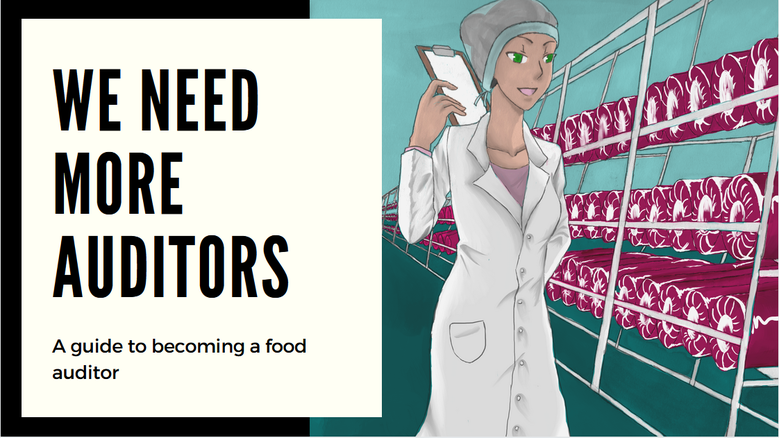We need more food auditors! – A guide to becoming an auditor
Last Updated on November 30, 2024
Have you ever heard of food safety audits?
A food safety audit is an important tool used for verifying proper food safety practices in food processing facilities. They are official inspections conducted by food safety management systems (FSMS) such as HACCP, BRC and SQF.
Food auditors are like health inspectors going to restaurants and performing health and safety checks. However their jobs a bit different because they work on a much bigger scale and there are a lot more things to lookout for.
Every quality assurance technician shakes at the thought of how much documentation is involved when auditors come into their facilities! Anyways, people who conduct these audits are ‘auditor’ and they play an important role in our food safety system.
Due to the increasing size of our food system, there is also a growing demand for food auditors in general. I bet you would be surprised to learn that despite the growing demand there are not enough people becoming auditors. This is alarming considering they are so important to our world’s food system.
Before diving into the issue of why there is a growing demand of food auditors let’s better understand what food auditors do.
Food auditors are professionals who:
- Perform food safety audits on client organizations to ensure food safety standards are upheld
- Manage the completion of assigned client food safety audits
- Utilize food safety knowledge and training to objectively analyze and assess food safety, sanitation, and security measures at client locations primarily restaurants and grocery stores.
- Educate and train client employees on food safety practices.
- Verify and document evidence of compliance and non-compliance and write comprehensive reports on audit findings
Why is there a lack of auditors?
According to an interview with Victor Muliyil, a Food Technical Program Manager at SGS North America the reason why there are not enough auditors is that there are not enough people with the credentials to become auditors.
In order to become an auditor, you need to have experience auditing facilities. Most food safety professionals do not have this experience. Becoming an auditor is not a profession you can just get out of university. Even a person who has worked in quality control for 10+ years may not necessarily have the credentials required for this position.
Auditors are specialized professionals who need to have the ability to assess risk, communicate and have both practical and technical knowledge. It can take up to two or three years for an auditor to become trained properly in a field.
What actions should your take if you want to become a food auditor?
Becoming an auditor isn’t just something you can do straight out of university. There are many requirements to this job including education and experience. However, these will vary depending on the country and the food safety body you are plan to work for.
Overall, there are four general things that these food safety bodies have in common. Please keep in mind this is a generalization!
1. Education
Having a post-secondary degree is a standard and it is rare for a food auditing body to accept you without one. These rare cases might occur if you have extensive industry experience such as 15+ years.
Food sector auditors need to obtain a university degree in a discipline related to the food manufacturing industry. Food specific degrees might include food science, food technology, dairy technology. Other possible degrees which could also be obtained include food engineering, agricultural / crop-based disciplines in the agricultural fields or the life sciences.
Your relevant degree is dependent on the scope you are looking to enter in .
These are just a few examples in the various fields. A great guide to learn even more is the GFSI Guidance Document. It will give you a specific break down of the education needed in each sector.
2. Experience
Experience. You can’t get around it. You absolutely need experience in the food industry in order to become a food auditor.
However, not any kind of working experience will do. You need a very specific type of working experience.
A food safety professional could have more than 20 years of experience working in QA and still not have the correct experience. How is this possible?
According to the GFSI guidelines,
All applicants are required to demonstrate operational experience with food hygiene and food safety based programs involving HACCP or other appropriate risk management systems. Alternatively, demonstrated experience involving equivalent practices, such as consulting or regulatory experience, that are deemed to provide experience relevant to the system being developed and the competencies described in this document for SQF auditors may be considered
Therefore, if you did 20 years of bench top lab work this wouldn’t qualify you for becoming an auditor. You need to have experience developing risk management systems.
As well, you must have experience in the sector you are applying for. For example, to become an auditor for the dairy sector the food safety professional will needs to have worked in the dairy industry.
Another thing you need is auditing experience but that will be discussed further in point 4.
3. Training
To become an auditor you must also have food safety training in the corresponding body you are planning to work for. Although there are overlaps in safety systems there are small nuances between them.
Training allows you to identify these differences
The length of the training sessions will vary but here is an example from the Criteria for SQF Food Safety Auditors (9th edition).
” Food safety applicants shall have successfully completed the following training courses
- Successful completion of the SQF Auditing SQF Systems (4 day duration) course
- Note: The Auditing SQF Systems training course completed after January 1, 2012 and a registered management system lead auditor training course of forty (40) hours duration (i.e. SQF Lead Auditor, Exemplar Global, IRCA) would meet the requirements after 2.2.2.1
- HACCP training (Extend a minimum of two days (16 hours) in duration, or equivalent
- Successful completion of the SQF Auditor examination administered by SQFI and available through the SQFI website
The training proves that you are competent in your learning. If you become an auditor you will continue to perform training courses throughout your career as safety regulations change from year to year.
4. Audit Experience
The final requirement which is directly related to why there are not enough auditors is audit experience.
Obtaining audit experience is a difficult thing to achieve because you have to find a way to have audit experience without actually being an auditor. According to SQF:
All applicants must complete, at a minimum, 160 hours of food safety audits. The audit experience must follow the following criteria:
- All referenced audits shall be third party or second party audits, or first party audits conducted by an independent auditor from a corporate head office. Internal audits of a facility as an employee of that facility will not be considered and should not be included on the audit log.
The way to gain experience is starting off by becoming an “observer” in audits. In other words, you come to audits and just watch everything occurring.
Over time you can eventually work up to a co-auditor, working under the Lead Auditor. Again as more time goes on you can begin to take a more dominant role. Eventually, the lead auditor could allow you to become a ‘full witness’ auditor where you will take over the function of Lead Auditor and be observed throughout the entire process before you will be officially signed off. However, this method only works if you are working with an auditing company.
If you are interested to learn more then a good place to start is to join the Institute of Food Science and Technology with their register of Professional Food Auditors and Mentors. They offer an auditor and mentor program which is meant to increase the competency of food auditors.
I’m a student/new grad what can I do?
If you are a student then you have to check out the Food Marketing Institute Foundation Food Safety Auditing Scholarship and Education Travel Grant in partnership with the Safe Quality Food Institute. The scholarship is meant to sponsor students currently enrolled in food and agricultural science majors who have a true interest in the field of accredited food safety auditing.
Where can I learn more about food safety auditors?
If you are interested in learning more about food auditors here are some useful resources.
- Food Marketing Institute Foundation– This organization seeks to ensure continued quality and efficiency in the food retailing system and is operated for charitable, educational and scientific purposes. Their primary focus is on food safety and defence. They even have a Food Safety Auditing Scholarship and Education Travel Grant.
- 8 Facts About Food Auditors- FoodGrads explores the exciting careers of food auditors and gives you the facts about this profession.
- International Food Safety & Quality Network– Although this is not a direct website to read about Food Safety Auditors it is a wonderful website with a community forum. There are many users who will gladly answer any questions you have about food auditors even if you are a student!
Cover art: Ronella Ferreros – Ronella Ferreros is an amateur artist, writer and aspiring historian. Her art style is entirely self-taught,
more influenced by pop culture than conventional artforms, as seen in her anime-esque expressions and poses. At the moment of this entry, there are
scant few of her works online due to her preference to physical drawing over digital art.

Author: Veronica Hislop Veronica is a Master’s thesis student in the Molecular Science program at Ryerson University. She is also a career partner with FoodGrads and has work experience in the food processing industry working both in R&D and QA.
Currently, she is performing research on water-in-oil emulsions stabilized by fat crystals. When she is not following her scientific endeavours you can find her enjoying Japanese anime, manga and video games.
Subscribe to our newsletter for details on mentorship sessions, workshops, webinars, as well as career and job fairs across Canada and the US!


leave your comment